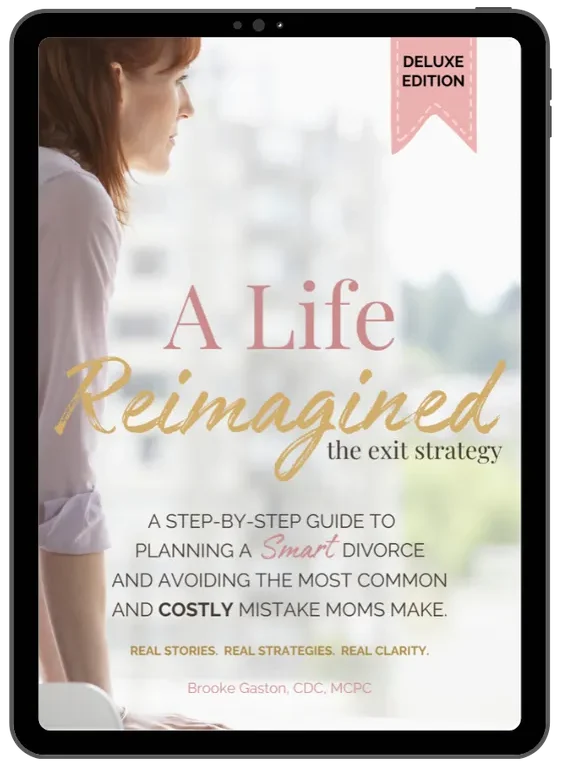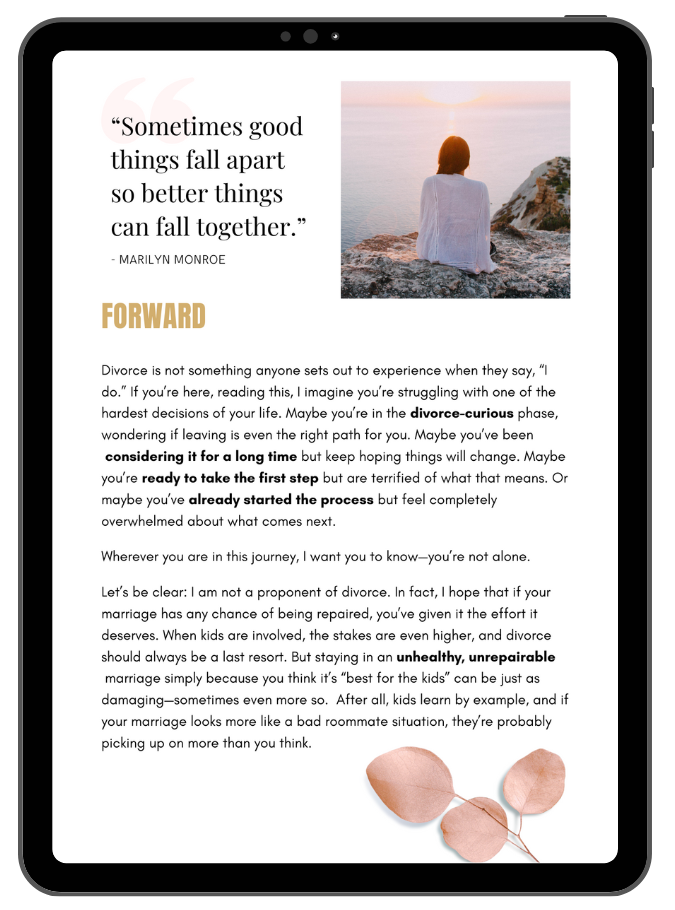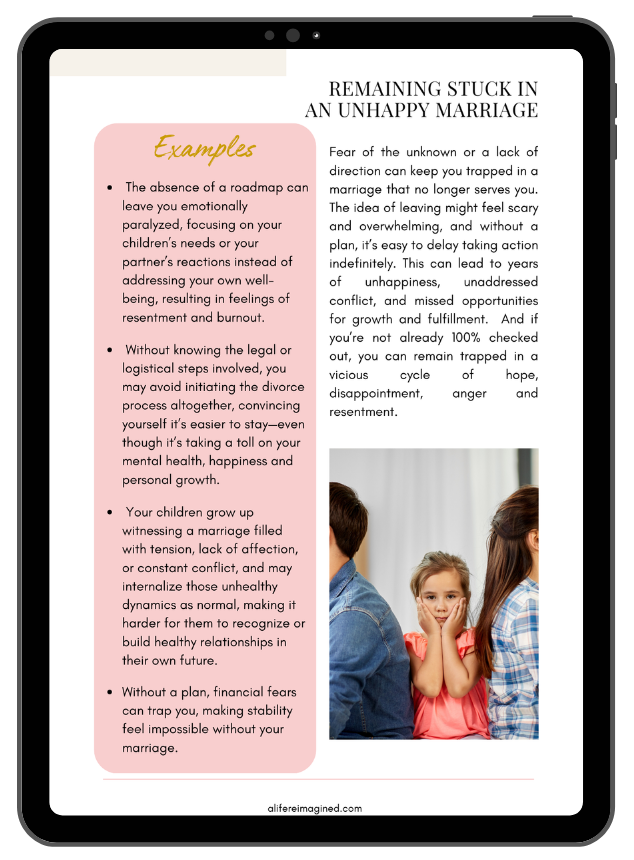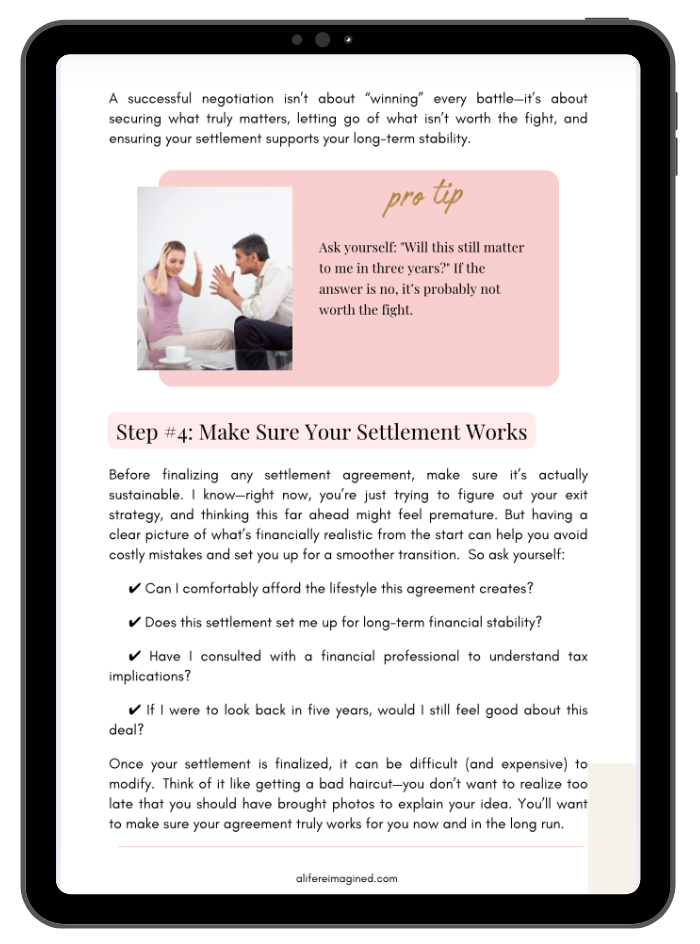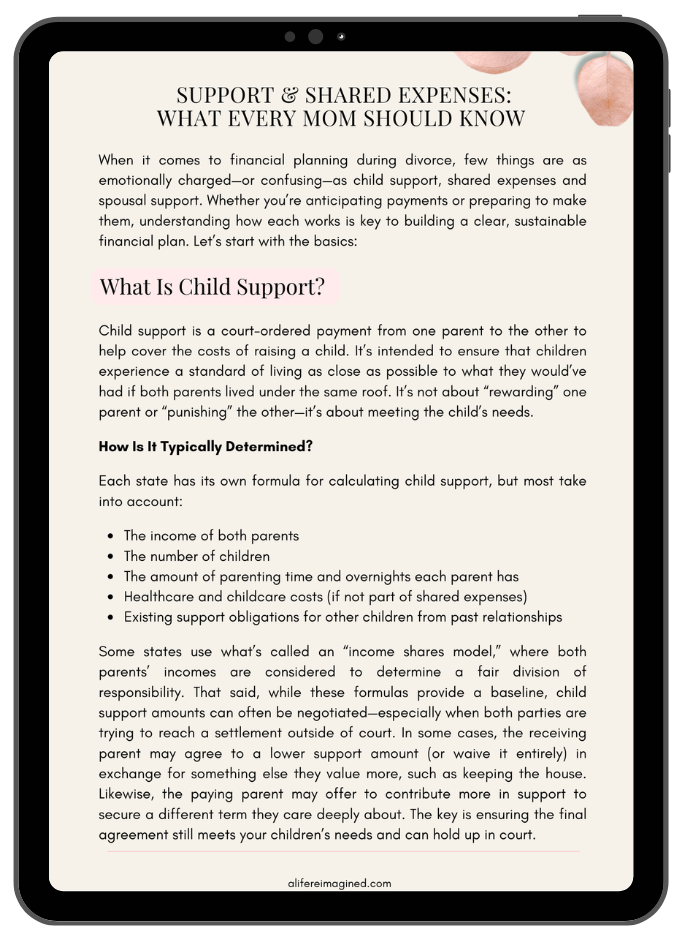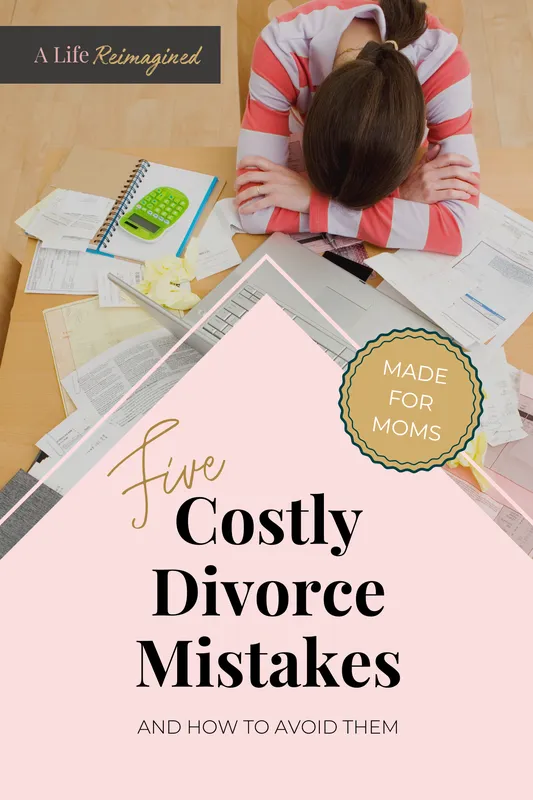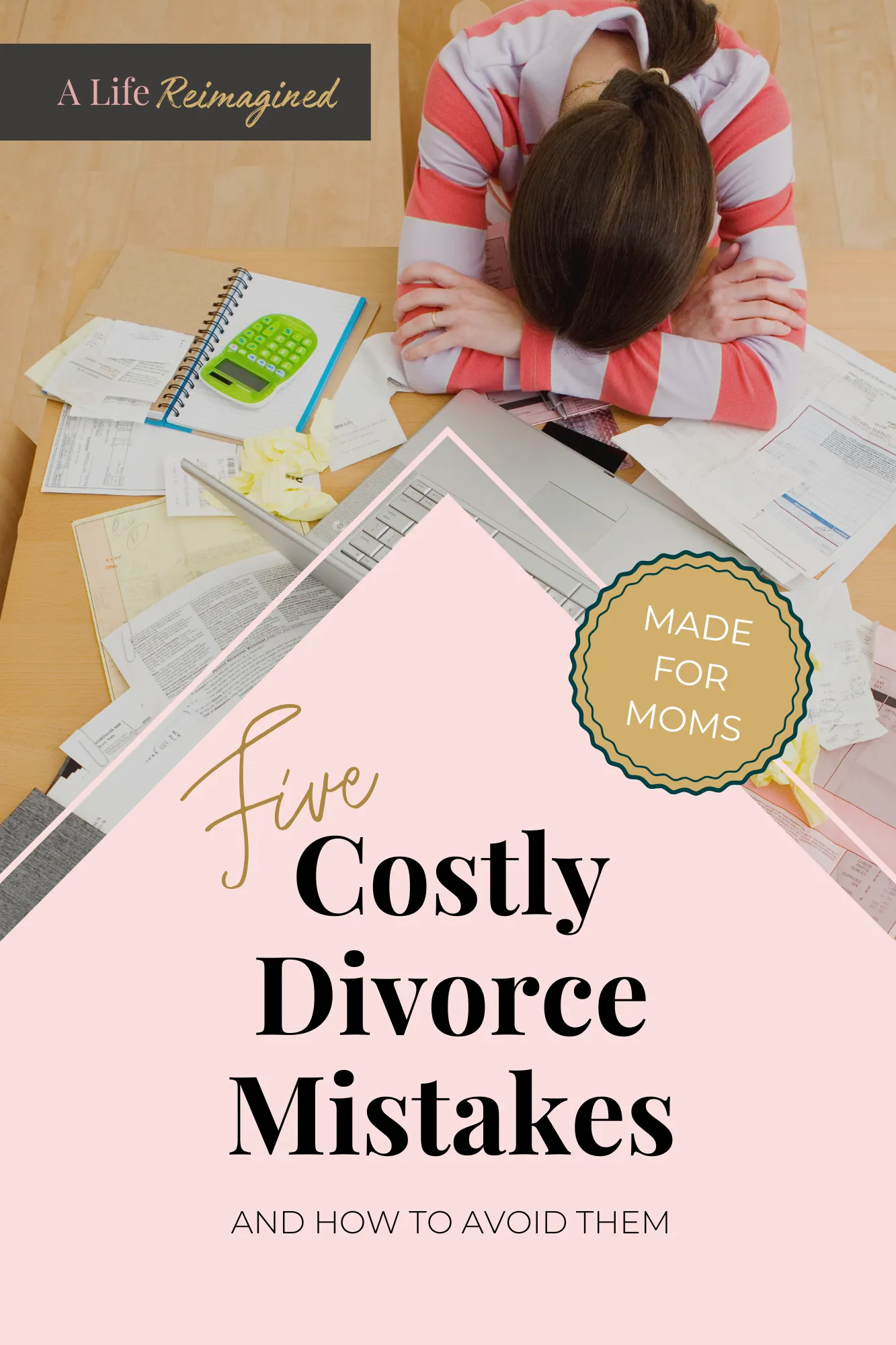
So, you’ve decided to go the divorce mediation route.
Maybe you’ve already scheduled the appointment.
Maybe your spouse suggested it and you’re just relieved someone is finally doing something to move things forward.
Maybe you’ve been interviewing mediators and are anxious to get to an agreement.
First of all—truly—good for you.
Divorce mediation can be a fantastic option. It’s often less expensive, less adversarial, and more respectful than dragging each other through court.
But there’s something I ask every mom I work with when they tell me mediation is on the calendar:
“Do you understand your legal rights?”
Cue the deer-in-headlights look. Followed by a pause. And then, usually:
“Uh… not really.”
Divorce Mediation Isn’t What Most People Think It Is
Here’s the most common misunderstanding:
People think the mediator is there to guide them toward the fairest solution.
But that’s not actually the mediator’s job.
A mediator must remain neutral.
They are not there to advocate for you (or your spouse).
They will not tell you if you’re about to agree to something that’s totally lopsided or financially risky.
They will not tell you if you’re entitled to pay or receive child support, even if they run the numbers for you.
They can offer general knowledge, but they are not allowed to give legal advice or coach you through your options.
In fact, if one spouse is more dominant, controlling, or persuasive, the outcome of mediation can end up favoring them—unless the other spouse comes in informed and prepared.
Ask Yourself This Before Beginning Mediation:
- Do I know my rights when it comes to custody, parenting time, or decision-making authority?
- Do I know what I’m legally entitled to in terms of assets, debts, and support?
- Do I understand what’s considered a fair or typical outcome in situations like mine?
- Am I confident I’ll be able to speak up and advocate for myself in a high-pressure, emotionally charged conversation?
If the answer is “not really” or “I’m not sure”—you’re not failing. You’re normal. But you’re also walking into a very important negotiation without the tools you need to protect yourself.
A Little Preparation Can Save You Years of Regret
You don’t have to hire a lawyer for the entire process. But it’s often very wise to speak with an attorney—even just for a free consultation—before heading into mediation. That way, you walk in:
- Knowing what to expect
- Having at least some understanding of your baseline rights
- Prepared to advocate for your future—not just avoid conflict in the moment
Because let’s be honest—when you’re a mom, divorce doesn’t just affect you. It impacts your children, your finances, your home life, and your long-term stability.
And as much as you may want to “just get it over with,” ask yourself:
Is it more important to get it done fast… or to get it done smart?
Questions You Might Be Asking Yourself (And What You Really Need to Know)
Let’s pause for a minute, because I know what might be swirling in your head. Let’s unpack a few common thoughts women have when they’re considering mediation—and why it’s so important to check your assumptions before walking in.
1. “If I engage an attorney, won’t they just try to talk me into hiring them to represent me?”
It’s a fair concern—and in some cases, sure, an attorney might recommend that, or even litigation if mediation truly isn’t safe or productive (like in high-conflict or abuse cases). But many attorneys today support mediation, especially when clients are informed and realistic. A good lawyer doesn’t want to blow up your process—they want to help you protect your rights. Speaking with one beforehand doesn’t commit you to full representation or a legal battle. It gives you clarity. And it’s always up to you how much you engage them.
Ask yourself: Am I avoiding legal input because I’m assuming it’ll derail things—or because I don’t feel ready to hear it?
2. “I don’t even know what I’d ask an attorney, so what’s the point?”
Exactly. And that’s why you talk to one. You don’t need to walk in with all the right questions—you need to walk out with more answers. Many women assume they need to be “ready” before reaching out for support. But clarity comes from the process, not before it.
Ask yourself: Am I expecting myself to already know everything I haven’t been taught?
Here’s where a divorce coach can help you identify key topics to bring up so your time with an attorney is strategic, not overwhelming.
3. “The mediator said we could do this without attorneys—and I really want to save money.”
Totally valid. Divorce is expensive, and you want to be efficient. But skipping legal guidance to save a few hundred dollars now can cost you thousands later in unequal asset division, support issues, or enforceability problems. Mediators mean well—but they’re neutral. That means they won’t flag if your agreement heavily favors your spouse.
Ask yourself: Is the money I’m trying to save today worth the risks I might be taking with my future?
4. “I’m so overwhelmed. I think the mediator will help me through this. My friend had a good experience.”
Maybe. And maybe not. Some mediators are incredible at managing emotions and dynamics. But others are very hands-off—and if your friend’s situation was different (say, more amicable or balanced), their experience won’t necessarily mirror yours. Hope is good. Preparation is better.
Ask yourself: Am I placing too much hope in someone whose job isn’t to protect me?
So, What’s the Takeaway?
If you recognize yourself in any of the thoughts above, you’re not alone. These are the exact questions and concerns I hear from moms all the time.
It makes sense—divorce isn’t just a legal process. It’s emotional, overwhelming, and filled with unknowns you didn’t exactly plan for.
Here’s the truth: Divorce mediation can be a smart, respectful way to move forward when it makes sense for your situation and when you walk in with your eyes open. But going in unprepared—without a clear understanding of your rights, your needs, or your boundaries—can lead to you agreeing to things you’ll regret later.
So before you sit down at the table, make sure you’ve done your homework. Not to start a fight, not to make things harder—but to stand in your truth and make informed, confident decisions for your future.
You don’t have to figure it all out on your own.
Whether it’s a one-time consultation with a legal professional, or partnering with a divorce coach who can help you sort through the fog and move forward with clarity—it’s okay to ask for support.
The more grounded and informed you are walking into mediation, the better your chances of coming out with an agreement that truly works for you. Not just today, but years from now.
Need Support Before Heading into Divorce Mediation? Let’s Get You Prepared.
Mediation can be a powerful path forward—but only if you’re prepared to make smart, informed decisions.
If you’ve already got mediation on the calendar, now is the time to get clear, grounded, and emotionally steady.
I offer personalized 1-1 and group coaching for moms who want to:
- Get clear on what matters most so you can make decisions that reflect your values
- Learn expert negotiation and communication tips to stay calm and effective—even when emotions run high
- Gain clarity on what’s reasonable and possible so you don’t waste energy fighting for things you’re unlikely to get
- Explore your options so you don’t feel stuck agreeing to something that doesn’t serve your future
I’m not an attorney, and I don’t offer legal advice. But I am a divorce expert—and I can help guide you through the emotional and strategic side of this process so you can make smarter decisions with less stress and overwhelm.
Let’s make sure you walk into mediation clear-headed, confident, and ready.




